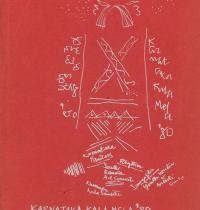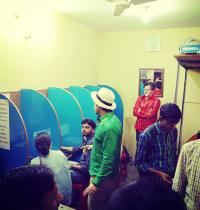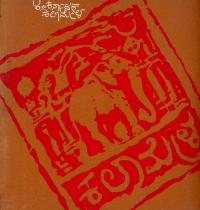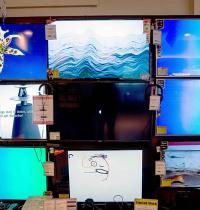Chinar Satishbhai Shah
Project Period: One year and three months
This Foundation Project implemented by IFA under Arts Projects (Research/Practice) will research into the lives of artist-led institutions that existed in Bangalore between 1990 and 2022. Chinar Satishbhai Shah will be the Coordinator for this project.
Chinar is an artist based in Bangalore, and the founder of Home Sweet Home, an exhibition series that uses domestic spaces to show works of art. She has received grants from the Inlaks Shivdasani Foundation, Pronto - Göteborg Stad Kultur of the city of Gothenburg, Arts and Humanities Research Council - UK, Experimenter, Kolkata, and UK Research and Innovation. She has presented her work at Tate Modern, Serendipity Arts Festival, and Kochi Biennale Collateral amongst others. She is the co-editor of the book Photography in India: From Archives to Contemporary Practice. Given her experience, she is best placed to be the Coordinator of the Foundation Project of IFA.
The history of art in India has been well documented, archived and written about by various institutions, both within and outside the country. These include design colleges arising out of the evolution of Company-established arts and crafts institutes, nationalised art colleges in industrial cities, institutions that came up as a response to colonial pursuits, as well as post-independence formations of national institutes of design, fashion technology and so on. However, there has seldom been an attempt to explore, archive and historicise institutions sparked and formed by individual artists or artist collectives, and thus discursively engage with what is often called the alternative history of art.
The current project will inquire into the history of artist-led institutions that existed in Bangalore from the 1990s to the present day. The economic liberalisation in 1991 marks a watershed moment which changed the course of Indian history in many aspects. Artists in Bangalore, as elsewhere in the country, have since set up institutions that respond to the increasingly restrictive and codified art spaces, market-driven galleries, the state’s hold on national museums, and the ever-shrinking space for creative and experimental expressions. Acting on this impulse, artists built new collaborative relationships with other artists and audiences, and created their own spaces and structures. The changing economic and political circumstances led artists to find ways to create significance of their work as well as generate cultural capital from their work and their labour outside of the mainstream art market. This project sees value in exploring this history of art, alongside studying the milestones of economic and social history of India during this time.
The alternative spaces set up by artists in Bangalore have largely been community-supported. Most of these spaces have historically functioned out of rented residential apartments where artists live and work, or in studios, garages or rent-free public spaces. The domestic life of the artist often sits right in the middle, with the politics and economy of the curatorial project - thus creating a unique site to defy the terms of the commercial art market in more than one aspect. The public operations of private spaces are closely linked to community engagement and are, in turn, shaped by the same. However, notwithstanding their significance, these artist-led spaces remain on the fringes of the art world. Bereft of the glamour of art fairs and biennales, such independent spaces end up, at best, becoming a footnote in the annals of art history. It is very rarely that museums, art fairs or biennales actively engage with these spaces or acknowledge their critical and urgent contribution to the art world. This project will open up and invite engagements in a larger discourse of how generations of artists have involved themselves in creating and sustaining alternative art spaces, personal narratives, and the narratives of the communities involved in these spaces.
Of the several artist-led institutions in Bangalore that have been set up since 1990, this project will study about 10 to 12 of them. These include Bar One, Samuha, Jaaga, Maraa, G159, Kanike Studio, Power Cut, Reliable Copy, Venkatappa Art Gallery (VAG) Forum and others. While some of these have closed down, others continue to function. The project will include qualitative interviews with the founders, artists, and other institutions with close ties to these initiatives to understand their early history, programming, economic model, community engagement, politics, artistic visions and other interactions that would enable a deep understanding of the individual history of each space.
Chinar will be supported on this project by two other artists – Kadamboor Neeraj, a visual artist and researcher; and Ajit Bhadoriya, a photographer.
The outcomes of the project will be about 10 to 12 commissioned essays and art works. Chinar will also write an essay on the process of this project. The materials created will be uploaded on a website. Further, each institution featured in this project will be provided a page on the Home Sweet Home website. The material generated from this project in the form of interviews, notes, images and video documentation will be housed in the archives of Home Sweet Home and will be made available to future researchers.
Deliverables from this project will be a downloaded version of the website, audio recordings of all interviews, the 10 to 12 commissioned essays, a process essay and copies of all public announcement posters.
In the domain of art history in India that is mostly dominated by cities like Delhi and Mumbai which are considered capitals of the art market and are full of commercial art galleries, IFA hopes that this project will enrich the field by prominently placing on its map, Bangalore and its artist-led institutions in defiance of the capitalist economy of art. In doing so, this project suitably addresses the broad framework of IFA's Project 560 programme and the Arts Projects (Research/Practice) in particular.
IFA will ensure that the implementation of this project happens in a timely manner and funds expended are accounted for. IFA will also review the progress of the project at midterm and document it through an Implementation Memorandum. After the project is finished and all deliverables are submitted, IFA will put together a Final Evaluation to share with Trustees.
This project is made possible with support from BNP Paribas India Foundation.




